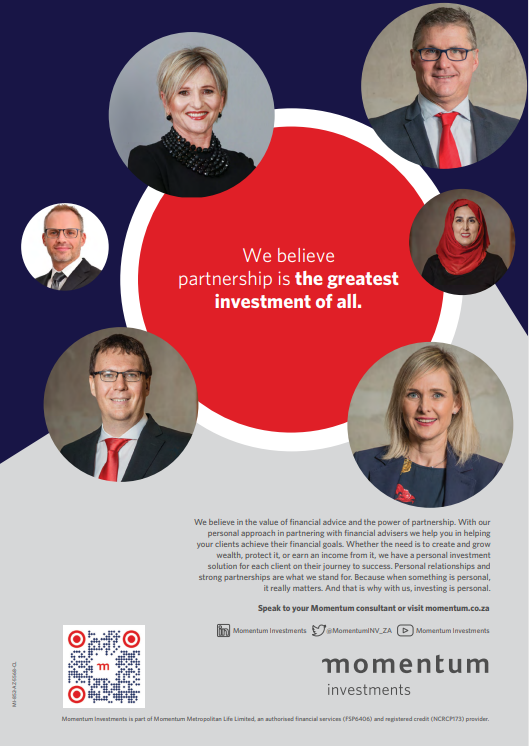Mike Adsetts, deputy chief investment officer at Momentum Investments
In the February 2022 budget speech Finance Minister Enoch Godongwane announced the further relaxation of exchange control with retirement funds being able to increase their offshore exposure to 45% from the 30% limit that was previously in place.

This presents an opportunity for both institutional focused funds and retail investors to increase their offshore exposure. However, investing is personal and advisers should carefully consider this decision and take the needs and circumstances of their clients into account.
South African equity markets make up a small part of global markets (less than 1%) and increasing offshore exposure, therefore, has the benefit of opening up portfolios to a far greater set of investment opportunities. Global portfolios have a greater number of investable shares and other assets to invest in, they can be diversified across geographies and sectors, some shares will be far more specialized in a particular sector or sub-sector than what we have locally, and there are industries to invest in that are not represented in the South African market.
Of course, there are risks that should be considered. The greater universe of investments and funds by sheer number can be daunting and before an investment is made it is important to have a clear understanding of what and why you are making it. The bigger range of investment opportunities and investment returns means that the range of potential outcomes and returns across portfolios will also be much greater. Currency risk is another material consideration that a financial adviser and the investor must consider. As we have learned over the years, the rand is not a one-way bet and there are periods when the currency strengthens and weakens for periods of time.
Most South African investors’ liabilities are rand based. This means that you always need to consider the impact of currency volatility and generally when making an allocation to offshore assets – the greater the allocation, the longer the client’s investment horizon or duration should be. This is so that the effect of currency volatility does not overwhelm the returns that are achieved from the underlying shares and other investments.
Typically, we have found that an offshore exposure of around 40% is reasonable. This takes into account a reasonable investment duration, the need to achieve real growth and outperform South African inflation (a proxy for local liabilities and their growth) and also that South African companies already derive a significant portion of their earnings from global markets.
The other benefit at a 40% level is it allows for some tactical variation of the offshore exposure. If there are better opportunities globally, you can increase the exposure (without risking breaching the regulatory limit) as well as reduce the offshore exposure when local market show better value.
Currently, we believe that SA markets represent better value and as such, there has not been a significant increase in offshore exposure in our portfolios at Momentum Investments. This view is shared across the investment industry. When the current global geo-political, inflation and growth risks pass, we fully expect that the general offshore exposure in funds will increase.
Another consideration for an adviser and their clients is how to access the offshore portfolio. Within funds, the ultimate exposure will be determined by the asset manager as defined in their mandate. The benefit of this is that the portfolio is managed by an investment professional and the decision is their responsibility. There are also feeder funds, rand-denominated unit trusts that invest offshore but are bought and sold in rands. Another approach is to invest in hard currency funds, a full externalisation of assets where you invest into portfolios in foreign currencies, typically US Dollars or other currencies.
The world of offshore investing can seem quite daunting but doesn’t have to be. To cut through the complexity, Momentum Investments has a world class portal to address all your offshore investment concerns, and challenges and even share best practices. Visit our Global Matters portal for independent views on offshore investment advice, legislation and top-of-mind matters to structure and get your clients to their investment goals.


